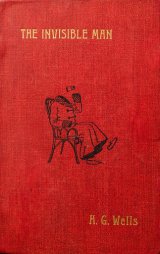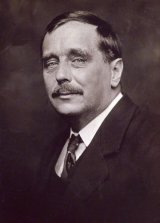The Invisible Man Page #13
The Invisible Man is a science fiction novel by H. G. Wells. Originally serialized in Pearson's Weekly in 1897, it was published as a novel the same year.
About four o'clock a stranger entered the village from the direction of the downs. He was a short, stout person in an extraordinarily shabby top hat, and he appeared to be very much out of breath. His cheeks were alternately limp and tightly puffed. His mottled face was apprehensive, and he moved with a sort of reluctant alacrity. He turned the corner of the church, and directed his way to the "Coach and Horses." Among others old Fletcher remembers seeing him, and indeed the old gentleman was so struck by his peculiar agitation that he inadvertently allowed a quantity of whitewash to run down the brush into the sleeve of his coat while regarding him. This stranger, to the perceptions of the proprietor of the cocoanut shy, appeared to be talking to himself, and Mr. Huxter remarked the same thing. He stopped at the foot of the "Coach and Horses" steps, and, according to Mr. Huxter, appeared to undergo a severe internal struggle before he could induce himself to enter the house. Finally he marched up the steps, and was seen by Mr. Huxter to turn to the left and open the door of the parlour. Mr. Huxter heard voices from within the room and from the bar apprising the man of his error. "That room's private!" said Hall, and the stranger shut the door clumsily and went into the bar. In the course of a few minutes he reappeared, wiping his lips with the back of his hand with an air of quiet satisfaction that somehow impressed Mr. Huxter as assumed. He stood looking about him for some moments, and then Mr. Huxter saw him walk in an oddly furtive manner towards the gates of the yard, upon which the parlour window opened. The stranger, after some hesitation, leant against one of the gate-posts, produced a short clay pipe, and prepared to fill it. His fingers trembled while doing so. He lit it clumsily, and folding his arms began to smoke in a languid attitude, an attitude which his occasional glances up the yard altogether belied. All this Mr. Huxter saw over the canisters of the tobacco window, and the singularity of the man's behaviour prompted him to maintain his observation. Presently the stranger stood up abruptly and put his pipe in his pocket. Then he vanished into the yard. Forthwith Mr. Huxter, conceiving he was witness of some petty larceny, leapt round his counter and ran out into the road to intercept the thief. As he did so, Mr. Marvel reappeared, his hat askew, a big bundle in a blue table-cloth in one hand, and three books tied together--as it proved afterwards with the Vicar's braces--in the other. Directly he saw Huxter he gave a sort of gasp, and turning sharply to the left, began to run. "Stop, thief!" cried Huxter, and set off after him. Mr. Huxter's sensations were vivid but brief. He saw the man just before him and spurting briskly for the church corner and the hill road. He saw the village flags and festivities beyond, and a face or so turned towards him. He bawled, "Stop!" again. He had hardly gone ten strides before his shin was caught in some mysterious fashion, and he was no longer running, but flying with inconceivable rapidity through the air. He saw the ground suddenly close to his face. The world seemed to splash into a million whirling specks of light, and subsequent proceedings interested him no more. CHAPTER XI IN THE "COACH AND HORSES" Now in order clearly to understand what had happened in the inn, it is necessary to go back to the moment when Mr. Marvel first came into view of Mr. Huxter's window. At that precise moment Mr. Cuss and Mr. Bunting were in the parlour. They were seriously investigating the strange occurrences of the morning, and were, with Mr. Hall's permission, making a thorough examination of the Invisible Man's belongings. Jaffers had partially recovered from his fall and had gone home in the charge of his sympathetic friends. The stranger's scattered garments had been removed by Mrs. Hall and the room tidied up. And on the table under the window where the stranger had been wont to work, Cuss had hit almost at once on three big books in manuscript labelled "Diary." "Diary!" said Cuss, putting the three books on the table. "Now, at any rate, we shall learn something." The Vicar stood with his hands on the table. "Diary," repeated Cuss, sitting down, putting two volumes to support the third, and opening it. "H'm--no name on the fly-leaf. Bother!--cypher. And figures." The vicar came round to look over his shoulder. Cuss turned the pages over with a face suddenly disappointed. "I'm--dear me! It's all cypher, Bunting." "There are no diagrams?" asked Mr. Bunting. "No illustrations throwing light--" "See for yourself," said Mr. Cuss. "Some of it's mathematical and some of it's Russian or some such language (to judge by the letters), and some of it's Greek. Now the Greek I thought you--" "Of course," said Mr. Bunting, taking out and wiping his spectacles and feeling suddenly very uncomfortable--for he had no Greek left in his mind worth talking about; "yes--the Greek, of course, may furnish a clue." "I'll find you a place." "I'd rather glance through the volumes first," said Mr. Bunting, still wiping. "A general impression first, Cuss, and then, you know, we can go looking for clues." He coughed, put on his glasses, arranged them fastidiously, coughed again, and wished something would happen to avert the seemingly inevitable exposure. Then he took the volume Cuss handed him in a leisurely manner. And then something did happen. The door opened suddenly. Both gentlemen started violently, looked round, and were relieved to see a sporadically rosy face beneath a furry silk hat. "Tap?" asked the face, and stood staring. "No," said both gentlemen at once. "Over the other side, my man," said Mr. Bunting. And "Please shut that door," said Mr. Cuss, irritably.
Translation
Translate and read this book in other languages:
Select another language:
- - Select -
- 简体中文 (Chinese - Simplified)
- 繁體中文 (Chinese - Traditional)
- Español (Spanish)
- Esperanto (Esperanto)
- 日本語 (Japanese)
- Português (Portuguese)
- Deutsch (German)
- العربية (Arabic)
- Français (French)
- Русский (Russian)
- ಕನ್ನಡ (Kannada)
- 한국어 (Korean)
- עברית (Hebrew)
- Gaeilge (Irish)
- Українська (Ukrainian)
- اردو (Urdu)
- Magyar (Hungarian)
- मानक हिन्दी (Hindi)
- Indonesia (Indonesian)
- Italiano (Italian)
- தமிழ் (Tamil)
- Türkçe (Turkish)
- తెలుగు (Telugu)
- ภาษาไทย (Thai)
- Tiếng Việt (Vietnamese)
- Čeština (Czech)
- Polski (Polish)
- Bahasa Indonesia (Indonesian)
- Românește (Romanian)
- Nederlands (Dutch)
- Ελληνικά (Greek)
- Latinum (Latin)
- Svenska (Swedish)
- Dansk (Danish)
- Suomi (Finnish)
- فارسی (Persian)
- ייִדיש (Yiddish)
- հայերեն (Armenian)
- Norsk (Norwegian)
- English (English)
Citation
Use the citation below to add this book to your bibliography:
Style:MLAChicagoAPA
"The Invisible Man Books." Literature.com. STANDS4 LLC, 2025. Web. 10 Jan. 2025. <https://www.literature.com/book/the_invisible_man_138>.




Discuss this The Invisible Man book with the community:
Report Comment
We're doing our best to make sure our content is useful, accurate and safe.
If by any chance you spot an inappropriate comment while navigating through our website please use this form to let us know, and we'll take care of it shortly.
Attachment
You need to be logged in to favorite.
Log In